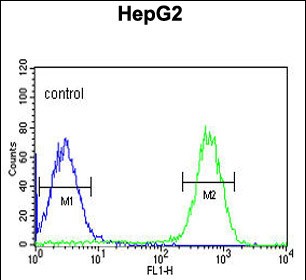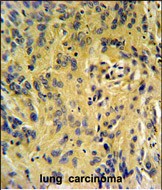


| WB | 1/500 - 1/2000 | Human,Mouse,Rat |
| IF | 咨询技术 | Human,Mouse,Rat |
| IHC | 咨询技术 | Human,Mouse,Rat |
| ICC | 技术咨询 | Human,Mouse,Rat |
| FCM | 1/200 - 1/400 | Human,Mouse,Rat |
| Elisa | 1/10000 | Human,Mouse,Rat |
| Aliases | Calcineurin B homologous protein 3, Tescalcin, TSC, TESC, CHP3 |
| Entrez GeneID | 54997 |
| WB Predicted band size | 24.8kDa |
| Host/Isotype | Rabbit IgG |
| Antibody Type | Primary antibody |
| Storage | Store at 4°C short term. Aliquot and store at -20°C long term. Avoid freeze/thaw cycles. |
| Species Reactivity | Human, Mouse |
| Immunogen | This TESC antibody is generated from rabbits immunized with a KLH conjugated synthetic peptide between 88-116 amino acids from the C-terminal region of human TESC. |
| Formulation | Purified antibody in PBS with 0.05% sodium azide. |
+ +
以下是关于EPCAM抗体的3篇代表性文献及其摘要:
---
1. **文献名称**:EpCAM: Structure and function in health and disease
**作者**:Litvinov SV 等
**摘要**:该综述详细解析了EPCAM蛋白的分子结构,包括其胞外域、跨膜区及胞内尾端,并探讨了EPCAM在正常上皮组织中的细胞黏附功能及其在肿瘤中过表达的机制。研究还总结了基于EPCAM抗体的诊断工具(如循环肿瘤细胞检测)和治疗策略(如抗体偶联药物)。
---
2. **文献名称**:Isolation of rare circulating tumour cells in cancer patients by microchip technology
**作者**:Nagrath S 等(通讯作者:Toner M)
**摘要**:本研究开发了一种基于抗EPCAM抗体修饰的微流控芯片(CTC-Chip),用于高效捕获癌症患者血液中的循环肿瘤细胞(CTC)。实验证明,该技术较传统方法灵敏度显著提高,为癌症早期诊断和疗效监测提供了新工具。
---
3. **文献名称**:Therapeutic bispecific antibodies against intracellular tumor antigens
**作者**:Hoffmann P 等
**摘要**:文章提出一种新型双特异性抗体设计,结合EPCAM抗体与T细胞激活分子,靶向实体瘤表面抗原EPCAM。临床前数据显示,该抗体能特异性识别肿瘤细胞并激活免疫杀伤,为实体瘤免疫治疗提供了潜在策略。
---
**备注**:以上文献均为领域内经典或前沿研究,覆盖基础机制、诊断技术和治疗应用。如需具体期刊信息或补充其他研究,可进一步提供方向。
Epithelial cell adhesion molecule (EpCAM), also known as CD326. is a transmembrane glycoprotein primarily expressed on the basolateral surface of epithelial cells. It plays a key role in cell-cell adhesion, proliferation, and stemness maintenance. EpCAM is overexpressed in many epithelial-derived cancers (e.g., colorectal, breast, and pancreatic cancers), making it a widely studied tumor-associated antigen.
EpCAM-specific antibodies are essential tools for detecting and characterizing EpCAM expression in research and diagnostics. These antibodies enable applications such as immunohistochemistry (IHC), flow cytometry, and Western blotting to study EpCAM's role in tumor progression, metastasis, and cancer stem cell biology. In clinical settings, EpCAM antibodies are used to identify circulating tumor cells (CTCs) or minimal residual disease.
Therapeutically, EpCAM has been targeted using antibody-based therapies. For example, catumaxomab, a bispecific antibody targeting EpCAM and CD3. was approved for malignant ascites treatment. However, challenges like variable EpCAM expression across tumors and on-target toxicity in normal tissues limit broader therapeutic use.
Recent research explores EpCAM's involvement in signaling pathways (e.g., Wnt/β-catenin) and its crosstalk with other oncogenic factors. Despite its established role, EpCAM's dual functions in tumor suppression and promotion remain context-dependent, necessitating further investigation. Overall, EpCAM antibodies remain vital for both mechanistic studies and translational oncology efforts.
×